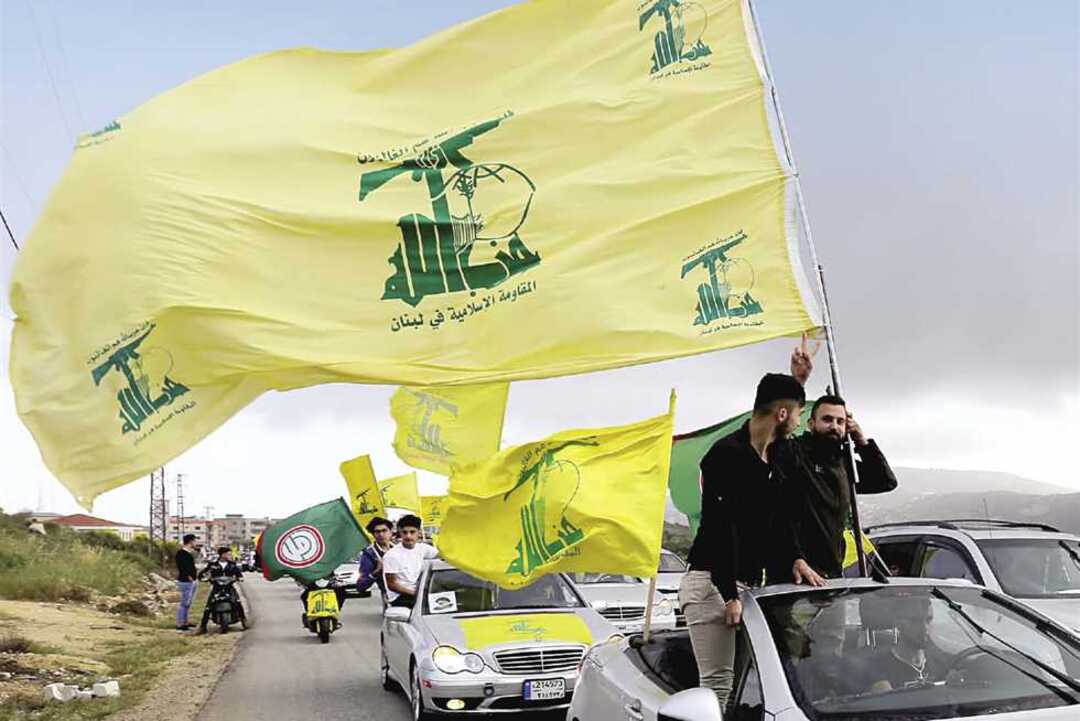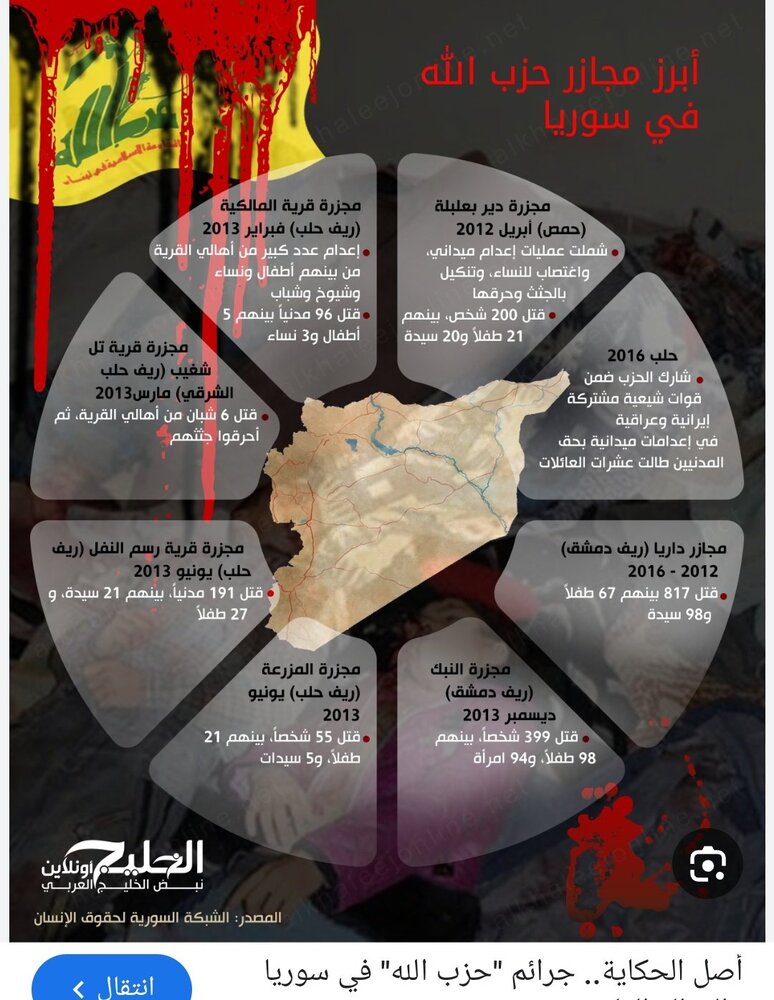-
Massacres Committed by Hezbollah in Syria: From 2013 to Present

Since the onset of the Syrian conflict in 2011, particularly with Hezbollah's intervention in the war in 2013, the group has been implicated in a series of massacres that have profoundly affected the military and humanitarian landscape of the country. Hezbollah’s involvement in Syria is viewed as a crucial support for Bashar al-Assad’s regime, with the party’s fighters sent to engage in battles against Syrian opposition factions and other armed groups.
Hezbollah began its military intervention alongside the Syrian army in 2013, with primary objectives that included protecting strategic regime positions and countering the advance of opposition forces. The party was assigned a variety of military operations in areas such as Qusayr, Zabadani, and the outskirts of Aleppo, among other hot spots.

During its presence in Syria, Hezbollah has been accused of committing massacres against civilians and opposition fighters. Numerous incidents have been documented:
1. **Massacre in Qusayr (2013):** The city faced a large-scale attack by Syrian forces and Hezbollah, leading to the deaths of hundreds of fighters and civilians. The assault aimed to suppress the battle for Qusayr, which was considered a critical point in the conflict.
2. **Massacre in Zabadani (2015):** The party committed massacres during military operations in Zabadani, resulting in the displacement of large numbers of residents and numerous civilian deaths.
3. **Repressive Practices:** Harsh methods such as indiscriminate shelling, forced displacement, and torture in detention centers have been employed, exacerbating the suffering of civilians.
The massacres committed by Hezbollah have significantly impacted the Syrian civilian population and opponents of the regime. These actions have heightened sectarian tensions and fostered animosity toward the party within the region. Moreover, they have contributed to the rise of terrorism in Syria and the proliferation of extremist groups that view Hezbollah's presence as a direct threat to local populations.
Hezbollah's intervention in Syria is one of the most notable aspects of the ongoing conflict, with repercussions extending beyond military confrontations to include long-term humanitarian and social effects. As the situation in Syria continues to evolve, the massacres committed by the party remain a contentious topic requiring further investigation and accountability in the broader pursuit of justice and peace in the region.
Tags
You May Also Like
Popular Posts
Caricature
BENEFIT Sponsors BuildHer...
- April 23, 2025
BENEFIT, the Kingdom’s innovator and leading company in Fintech and electronic financial transactions service, has sponsored the BuildHer CityHack 2025 Hackathon, a two-day event spearheaded by the College of Engineering and Technology at the Royal University for Women (RUW).
Aimed at secondary school students, the event brought together a distinguished group of academic professionals and technology experts to mentor and inspire young participants.
More than 100 high school students from across the Kingdom of Bahrain took part in the hackathon, which featured an intensive programme of training workshops and hands-on sessions. These activities were tailored to enhance participants’ critical thinking, collaborative problem-solving, and team-building capabilities, while also encouraging the development of practical and sustainable solutions to contemporary challenges using modern technological tools.
BENEFIT’s Chief Executive Mr. Abdulwahed AlJanahi, commented: “Our support for this educational hackathon reflects our long-term strategic vision to nurture the talents of emerging national youth and empower the next generation of accomplished female leaders in technology. By fostering creativity and innovation, we aim to contribute meaningfully to Bahrain’s comprehensive development goals and align with the aspirations outlined in the Kingdom’s Vision 2030—an ambition in which BENEFIT plays a central role.”
Professor Riyadh Yousif Hamzah, President of the Royal University for Women, commented: “This initiative reflects our commitment to advancing women in STEM fields. We're cultivating a generation of creative, solution-driven female leaders who will drive national development. Our partnership with BENEFIT exemplifies the powerful synergy between academia and private sector in supporting educational innovation.”
Hanan Abdulla Hasan, Senior Manager, PR & Communication at BENEFIT, said: “We are honoured to collaborate with RUW in supporting this remarkable technology-focused event. It highlights our commitment to social responsibility, and our ongoing efforts to enhance the digital and innovation capabilities of young Bahraini women and foster their ability to harness technological tools in the service of a smarter, more sustainable future.”
For his part, Dr. Humam ElAgha, Acting Dean of the College of Engineering and Technology at the University, said: “BuildHer CityHack 2025 embodies our hands-on approach to education. By tackling real-world problems through creative thinking and sustainable solutions, we're preparing women to thrive in the knowledge economy – a cornerstone of the University's vision.”
opinion
Report
ads
Newsletter
Subscribe to our mailing list to get the new updates!






















